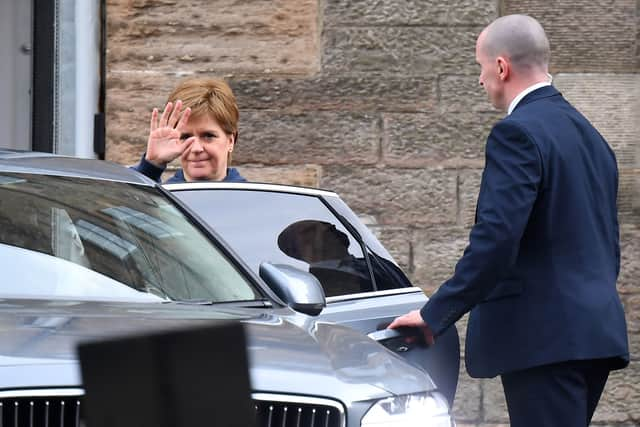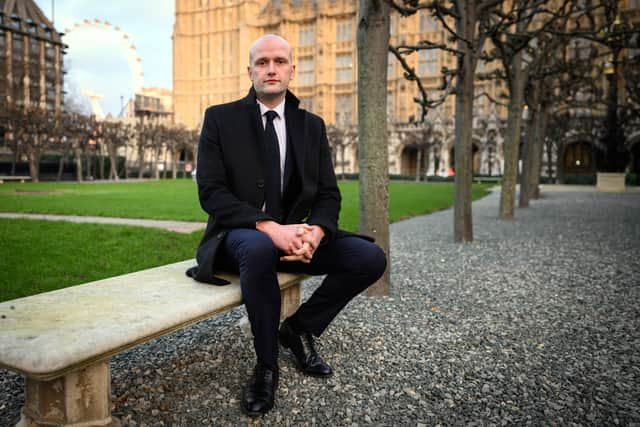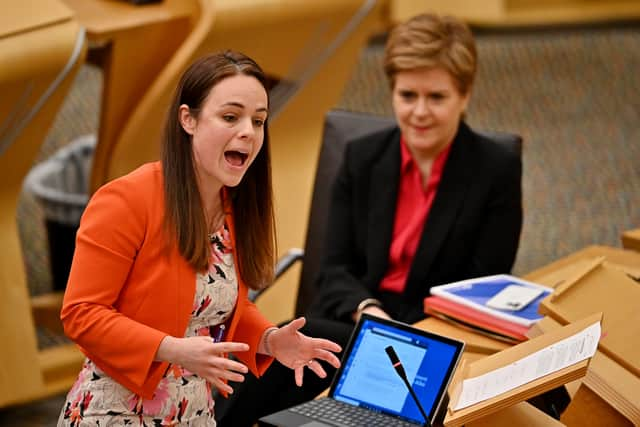Nicola Sturgeon resignation: why Scottish First Minister took the decision to step down amid gender debate
and live on Freeview channel 276
Nicola Sturgeon shocked the political world by announcing her resignation from Scotland’s top job after eight years in post.
The SNP leader has often been heralded as one of the most successful UK political leaders of her era, staying in power among no less than five UK Prime Ministers and leading her party to successful Scottish and UK election results.
Advertisement
Hide AdAdvertisement
Hide AdTherefore, it might seem out-of-the-blue for the First Minister to announce her decision to step back. But the reason for this may be hiding in plain sight.
She told reporters on the morning of her resignation that the country was at a “critical moment”, but that she was no longer the one to steer the ship through the storm. From a changing political landscape to recent controversies, the SNP is now searching for calm.
But what were the possible reasons for Sturgeon stepping back -and what could it mean for the future of the party? NationalWorld takes a look at the situation.
The gender debate and Isla Bryson
There is no doubt that Sturgeon was under a lot of pressure after the disaster of the overturned Gender Recognition Reform Bill. Not only was the SNP defeated by Westminster in the incident, but the party saw some division both within its membership and supporters.
Advertisement
Hide AdAdvertisement
Hide AdSturgeon remained staunchly pro-reform and voiced her support for the trans community, telling reporters in the past “trans women are women”. However, she came under pressure following the case of trans prisoner and convicted rapist Isla Bryson.


Sturgeon and the SNP were heavily questioned after Bryson was initially placed in a women’s-only institution, although separate to the other prisoners. A political row broke out over the issue, with Sturgeon repeatedly questioned over whether Bryson is a woman and should be treated as such in the prison service.
The SNP leader struggled to field questions over whether Bryson’s transition was legitimate, with the normally level-headed politician stumbling over questions and failing to give straight answers in interviews.
Sturgeon dealt with, not only political criticism, but also personal criticism over the issue. In her resignation speech, she cited the “physical and mental impact” of the job on her wellbeing as well as the “brutality of politics” and it’s hard not to link the recent attention to this pressure.
‘The time is right to make way for someone else’
Advertisement
Hide AdAdvertisement
Hide AdSo often in politics, we see tenures come to an end after a string of controversies or even a vote of no confidence. While Sturgeon was under pressure over the gender reform debate, her resignation came as a surprise to many.
In her speech she said: “Since my first moments in the job, I have believed that part of serving well would be to know – almost instinctively – when the time is right to make way for someone else. And when that time comes, to have the courage to do so. In my head and my heart I know that time is now.”
The SNP’s Westminster branch has already undergone changes, with new leader Stephen Flynn taking charge of the group in December after Ian Blackford stood down. This seemed to launch the winds of change in the SNP.


Sturgeon has led the SNP for eight years, from directly after the first independence referendum. The party and Scotland itself has changed monumentally in this space of time.
Advertisement
Hide AdAdvertisement
Hide AdThe main aim of the party remains independence, however, some political disagreements - including the gender reform debate - have seen SNP MSPs splinter into factions in some circumstances.
In addition to this, Flynn hopes to lead the Westminster group a bit more independently than his Sturgeon-ally predecessor. The First Minister and many in her party will have recognised that unity is key to a strong party, and stepping back may help lead to this once again.
The SNP’s predicament
The run up to the next general election is undoubtedly one of the most important periods for the SNP since the 2014 independence referendum. This is because the party is said to be preparing to use the general election as a ‘de facto’ referendum on independence after they were blocked by the Supreme Court from holding a legally-binding referendum.
Now, with the party’s long-serving leader standing down, attention will turn to her possible replacements and the direction they will steer the party in. But it won’t be an easy task to find a new leader. The current frontrunner is Kate Forbes. The Finance Secretary is would mark a stark change from Surgeon’s personal politics.
Advertisement
Hide AdAdvertisement
Hide AdForbes has spoken out against abortion, and was one of the few SNP MPs to abstain on the controversial gender recognition debate. But will the party take the risk of losing supporters of the reforms to bring in a new leader which could bring those onside who strayed from the SNP in the wake of the gender debate?


Outside of Forbes, other names being bandied around in the leadership discussion includes Angus Robertson, John Swinney and Humza Yousef. None of the names currently have the political standing of Sturgeon, but all political leaders have to start somewhere.
Additionally, heading into the push for independence without a headline leader might dampen their strength in the field. In 2014, the SNP were one of the only pro-independence players - now voters have the choice of the Greens and Alba, the latter of which is led by former SNP frontman Alex Salmond.
Some supporters have already jumped ship to Alba for the party’s stance on gender in contrast to the SNP. Without a strong leader like Sturgeon, the SNP may split this independence vote further and their ‘de facto referendum’ might not end the way they would like…
Comment Guidelines
National World encourages reader discussion on our stories. User feedback, insights and back-and-forth exchanges add a rich layer of context to reporting. Please review our Community Guidelines before commenting.
